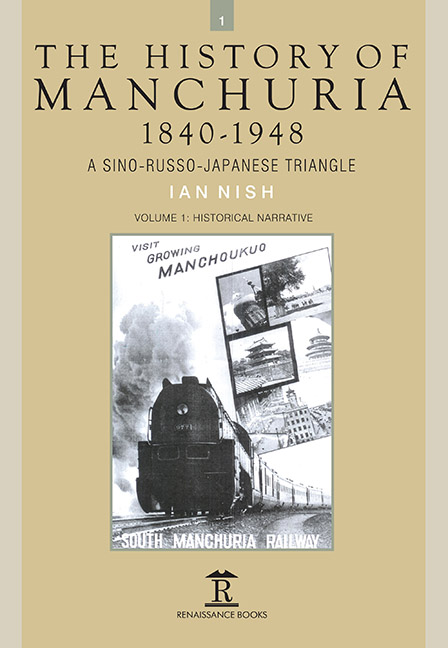Book contents
- Frontmatter
- Dedication
- Contents
- Preface
- Acknowledgements
- Name Conventions
- List of Abbreviations
- List of Maps
- Chapter One Manchuria and Russian Ambition, 1840s–1890s
- Chapter Two Sino-Japanese War and After, 1894–1900
- Chapter Three Prelude to the Russo-Japanese War, 1900–1905
- Chapter Four Railways, Reforms and Revolutions, 1906–1914
- Chapter Five Wartime Turmoil in Manchuria, 1915–1922
- Chapter Six Chang Tso-Lin’s Manchuria, 1922–28
- Chapter Seven Chinese Nationalism and Foreign Railways, 1929–1931
- Chapter Eight Lytton Commission in Manchuria, 1931–1932
- Chapter Nine Manchukuo: From Republic to Empire, 1933–1937
- Chapter Ten A Decade of Wars, 1938–1948
- Epilogue
- Map
- Select Bibliography
- Index
- Volume 2: Select Primary Sources
- Miscellaneous Frontmatter
- Dedication
- Miscellaneous Frontmatter
- Chapter 1 1840–1894
- Chapter 2 1895–1899
- Chapter 3 1900–1905
- Chapter 4 1905–1914
- Chapter 5 1915–1922
- Chapter 6 1922–1928
- Chapter 7 1929–1931
- Chapter 8 1931–1932
- Chapter 9 1933–1937
- Chapter 10 1938–1948
- Apendix Appeal by the Chinese Government
Epilogue
Published online by Cambridge University Press: 18 November 2023
- Frontmatter
- Dedication
- Contents
- Preface
- Acknowledgements
- Name Conventions
- List of Abbreviations
- List of Maps
- Chapter One Manchuria and Russian Ambition, 1840s–1890s
- Chapter Two Sino-Japanese War and After, 1894–1900
- Chapter Three Prelude to the Russo-Japanese War, 1900–1905
- Chapter Four Railways, Reforms and Revolutions, 1906–1914
- Chapter Five Wartime Turmoil in Manchuria, 1915–1922
- Chapter Six Chang Tso-Lin’s Manchuria, 1922–28
- Chapter Seven Chinese Nationalism and Foreign Railways, 1929–1931
- Chapter Eight Lytton Commission in Manchuria, 1931–1932
- Chapter Nine Manchukuo: From Republic to Empire, 1933–1937
- Chapter Ten A Decade of Wars, 1938–1948
- Epilogue
- Map
- Select Bibliography
- Index
- Volume 2: Select Primary Sources
- Miscellaneous Frontmatter
- Dedication
- Miscellaneous Frontmatter
- Chapter 1 1840–1894
- Chapter 2 1895–1899
- Chapter 3 1900–1905
- Chapter 4 1905–1914
- Chapter 5 1915–1922
- Chapter 6 1922–1928
- Chapter 7 1929–1931
- Chapter 8 1931–1932
- Chapter 9 1933–1937
- Chapter 10 1938–1948
- Apendix Appeal by the Chinese Government
Summary
IN HIS REVIEW of the year 1948, Generalissimo Chiang Kai-shek wrote:
Mukden fell into the hands [of the Communists]. The Mukden tragedy of 1931 has repeated itself… During this national crisis I cannot but blame myself for my inadequate leadership.
While accepting blame himself, Chiang was implicating the Japanese, and claiming that their actions since 1931 had a bearing on the outcome in China and had affected the future of Northeast Asia. Thoughtful Japanese, pondering the news of what was happening in former Manchukuo in the late 1940s, did not deny this privately. In the discourse of newspaper readers in western Japan, where most hikiagesha (evacuees) from Manchuria first returned to, it was a topic often raised. They were concerned about the past but also about the humanitarian aspect of the present and the future spread of communism to Japan.
Among later Japanese scholars, Professor Tamanoi quotes many examples of disillusion and annoyance among farmers who had been enticed by the state to go to Manchuria and forced to leave their land in 1945 in humiliating circumstances. In his many-sided study, Professor Yamamuro Shinichi explains Japan’s visions for Manchukuo in terms of illusion, mainly on the part of the military. He concludes that the problem began ‘with the artificial founding of a state by a foreign people [Japan], introduced large numbers of immigrants and brought about its destruction by the armed forces of a foreign power [Russia]’.
This study has investigated the various phases of Manchurian history from the ascendancy of the Manchu dynasty in the seventeenth century. The first section of the book dealt with frontier adventurism, starting with the exploits of individual Russian adventurers along the Amur River. On the accession of Tsar Alexander II, there was a fresh incentive on the part of an enterprising group of Russian frontier officials to settle on the left bank of that river confirmed by China in the treaty of 1858 and later on land to the east of the Ussuri River, confirmed in the 1860 treaty. Whereas Western expansion in the east had been into territories already over-populated, Russia took over land previously under-populated, uncultivated and possibly unclaimed.
- Type
- Chapter
- Information
- The History of Manchuria, 1840-1948A Sino-Russo-Japanese Triangle, pp. 211 - 219Publisher: Amsterdam University PressPrint publication year: 2016

